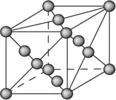
Machine-learning techniques for atomistic modeling
Researchers at AMC develop machine-learning methods to accelerate and enhance atomistic simulations of chemical systems. By training models on quantum-mechanical data, we create efficient interatomic potentials with near first-principles accuracy. These approaches enable large-scale simulations of materials and molecules that were previously computationally infeasible. Our work bridges physics-based modeling and data-driven predictions to unlock new insights in physics, materials science, and chemistry.

Atomistic modeling in materials science
We use atomistic modeling to understand and predict the behavior of molecules and materials at the atomic scale. These simulations complement experiments by revealing mechanisms that are challenging to observe directly, such as defect dynamics or phase transitions. By integrating computational and experimental insights, the research at AMC achieves a deeper, more reliable understanding of material properties and performance. This synergy accelerates the design of advanced materials for applications in energy science and electronics.

Data-driven atomistic modeling
A key theme at AMC is new data-driven models that serve to efficiently explore and predict the complex behavior of chemical systems at the atomic scale. By combining machine learning with simulation and experimental data, we uncover structure-property relationships and guide molecular-scale discovery. Using adaptive design of experiments, we strategically select simulations or measurements to maximize information gain and model accuracy. This closed-loop integration of computation and experiment accelerates the development of novel materials with targeted properties.

Novel electronic structure methods
We develop novel electronic structure methods that go beyond traditional density functional theory in both accuracy and efficiency. AMC’s vision is designing new approaches to capture complex quantum phenomena – including strong correlations and excited-state dynamicos – while retaining computational efficiency for large-scale simulations. By combining machine learning and linear-scaling techniques, we enable quantum-level insights into systems previously beyond reach. These methods are closely integrated with experimental validation to ensure their impact across materials science, chemistry, and physics.